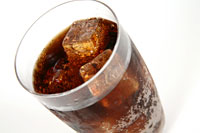More Health and Nutrition Bites
Related
Another reason to avoid added sugar
Because I'm an advocate of avoiding processed foods and sugary drinks, I don't spend a lot of time talking specifically about added sugars. Yet the average American drinks enough soda - between 45 and 50 gallons of it per person - to consume about 39 pounds of sugar a year.
No Added Sugar
In the last several decades we here in the United States have eaten more and more sugar, mostly in the form of "added sugars." These sweeteners are usually in the form of sucrose and high-fructose corn syrup and are intended to make highly-processed foods taste better (or more accurately, sweeter).
Added sugars may affect heart health risk factors in children
Last week I shared a meta-analysis that concluded that higher levels of sugar intake in an adult's diet were "strongly associated with higher triglycerides, total as well as LDL cholesterol (the bad cholesterol), and blood pressure." While that study was interested in total sugars and not strictly added sugars, this week's study suggests that those effects are not limited to adults.
Health & Nutrition Bites
Get the latest health and diet news - along with what you can do about it - sent to your Inbox once a week. Get Dr. Gourmet's Health and Nutrition Bites sent to you via email. Sign up now!
Soda and Stroke
 Did you know that as of 2009, the average American drinks over 45 GALLONS of carbonated beverages, both sugar-sweetened and non-caloric, per year? It's the single largest source of added sugar in our diet.
Did you know that as of 2009, the average American drinks over 45 GALLONS of carbonated beverages, both sugar-sweetened and non-caloric, per year? It's the single largest source of added sugar in our diet.
It's clear that drinking soda is linked to a variety of health problems, including diabetes and heart disease. While research on diet soda contributing to weight gain is mixed, those 120 or so calories in every can of sweetened soda is not doing your effort to control calories any favors, either. Now we can add "increased risk of stroke" to the joys of carbonated beverages.
Researchers with the Cleveland Clinic and Harvard University made use of information gathered through two large-scale, long-term studies of health professionals (Am J Clin Nutr 2012;95(5):1190-9). The participants responded to detailed medical, dietary, and lifestyle questionnaires every two years starting as early as 1976 and continuing today. With this data, the researchers could compare the diets of those who experienced a stroke of any kind with those who did not - a total of nearly 150,000 people.
As compared to those who drank no soda at all, they found that those who drank at least 1 serving of soda per day, regardless of whether those sodas were sugar-sweetened or low-calorie, were 16% more likely to suffer a stroke.
On the other hand, substituting 1 cup of decaffeinated coffee for 1 serving of sugar-sweetened soda reduced their risk of stroke by 10% (9% for for caffeinated coffee). Similarly, substituting 1 cup of decaffeinated coffee for 1 serving of non-sweetened soda reduced the participants' risk of stroke by 13% (11% for caffeinated coffee).
These results took into account such heart disease and stroke risks as weight, exercise levels, and dietary considerations such as trans-fats, and whether the participant had been diagnosed with high blood pressure or diabetes.
What this means for you
While these results do not necessarily mean that drinking soda will cause a stroke, they should still put you off of any more than the occasional indulgence. Drink water, coffee (regular or decaf), or tea.
First posted: May 16, 2012
